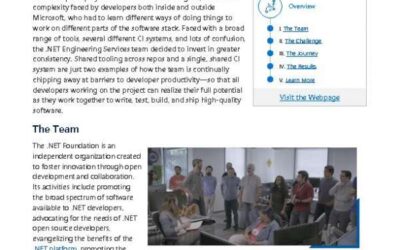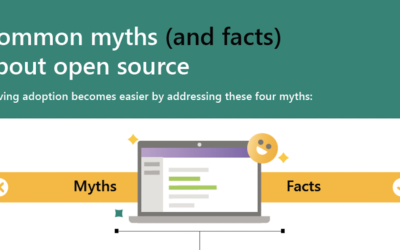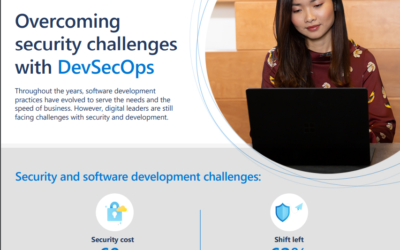.NET Core invests in consistency to accelerate open-source innovation
“The goal of the .NET Foundation is to foster innovation by harnessing the power of the open-source community. However, inconsistent tool implementations forced the team to take a fresh DevOps approach and leverage the flexibility of Azure Pipelines and its support for GitHub to consolidate 80 different repositories with more than 800 contributors to shared tooling.
Subscribe to stay connected download the full white paper detailing how the .NET Engineering Services invested in consistency to help a wide range of .NET Core developers boost their productivity.”
Microsoft Teams Innovations Designed for Hybrid Work
The shift to remote work has changed how, when, and where we work. Microsoft Teams empowers employees with the tools for success in the new hybrid work model. Presenters can utilize updated features like chat, live reactions, and Whiteboard to make the Teams meetings experience uniquely modern. Update your Outlook calendar to reflect your new hours or remote status or join an in-person meeting using new intelligent cameras and AI powered active speakers that enhance connection.
Digitalization future-proofs business thanks to connectivity and the cloud
Transportation and infrastructure is moving to the cloud, as evidenced by a Microsoft Azure “data lake” built with support by Azure DevOps for leading transportation manufacturing company Schmitz Cargobull AG. Semi-trailer customers now have access to one portal where they can track anything from performance to vehicle condition.
Instead of making large investments in on-premises hardware, you can instead use Azure cloud products to connect different databases into one convenient interface.
Common myths (and facts) about open source
“For some companies, the idea of adopting open-source software doesn’t seem viable. There are many myths about open source, but the truth is that it can facilitate security, be easy to maintain and integrate, and scale to whatever heights you require.
Whether you’re concerned about security, maintenance, or compatibility, open source can open up a world of possibilities for companies across all industries.
Sign up to stay connected—we can help you learn more about using Microsoft Azure DevOps with GitHub and Visual Studio and unravel the myths and facts about open source.
Why You Need an Open Source Software Strategy
We know that software developers use open-source software to confront major technological challenges, and that it’s critical to have a strategy in place that governs its use. If open source is new to you, find some recommendations on how to build a strategy and take a staggered approach to enter into this collaborative digital landscape.
Bertrandt’s HARRI is a self-driving success, thanks to Microsoft Azure
Maps that precisely plot road signs, traffic lights, lanes, and sidewalks within a few centimeters—that’s the sort of data-intensive information required to make Bertrandt’s self-driving car project HARRI a reality. And it took Microsoft Azure Services to tame the tremendous flood of data needed to drive HARRI, as a small map’s worth of data with this level of detail would overwhelm the vehicle’s on-board storage capabilities. Azure DevOps facilitated the creation of the exacting software for this solution by coordinating the work of development, operations, and quality assurance teams.
Automate code-to-cloud workflows with a seamlessly integrated DevOps platform
With the ability to commit changes and quickly deploy them to the cloud using tools such as GitHub Actions and Azure Pipelines for CI/CD, developer teams gain agility in deploying and maintaining their apps.
Sign up to stay connected. We can help you learn more about using Microsoft Azure DevOps with GitHub and Visual Studio.
Microsoft Aims To Simplify Cloud Native Development With The Dapr Project
Distributed Application Runtime or #Dapr is a new, event-driven runtime, open-source project that simplifies cloud-native development. Dapr is based on containers, integrates well with Kubernetes, and does the plumbing and heavy lifting involved in developing a modern, highly distributed application. Developers can now focus on what they want to: business logic and migrating legacy code. They can lean on Dapr to provide their applications with the required scale, resiliency, and elasticity of cloud-native architectures.
Low code vs. no code and the future of application development
Low code and no code platforms make application and software development accessible to businesses or projects that may not always need a full development team. The low code technology market is predicted to grow 23 percent globally in 2021—providing opportunities to save money and time.
Improve observability, strengthen security, and proactively remediate vulnerabilities
There are DevOps tools for every phase of the app lifecycle. Use Azure to implement DevOps practices throughout application planning, development, delivery, and operations. By applying the right combination of DevOps technologies, culture, and processes, you can achieve continual software delivery and offer better value for your customers.
Sign up to stay connected. We’ll help you learn more about using Azure DevOps with GitHub and Visual Studio from Microsoft.
Dow uses vision AI at the edge to boost employee safety and security with Azure
Dow is a leader in materials science, focused on delivering innovative and sustainable customer-centric solutions. An important priority for the chemical company is safety, and Microsoft Azure played a crucial role in enabling preventative leak detection with the goal of zero safety-related events at its facilities. The initial solution leverages Azure AI to analyze live video and uses an app to trigger notifications to the operator if it detects a possible leak. Azure Video Analyzer, coupled with Azure DevOps, provided a quick, low-latency, low-resource, and easily scalable solution. Machine learning ensures the model is continually refined, so it gets better with each interaction.
Best of all, this model can be leveraged for other applications, such as detecting when employees aren’t wearing proper PPE in industrial locations, and security monitoring.
10 reasons why every enterprise needs a DevOps strategy for 2021
Traditional approaches to development aren’t keeping up with the complexity, pace, and scale of change in today’s digital landscape. With a DevOps strategy, teams work iteratively, delivering real-time responses to threats and opportunities. Scaling DevOps successfully means automating key areas of IT and operations—boosting sales and productivity. And that’s just the beginning.
Learn why every enterprise needs a DevOps strategy for 2021.
Overcoming security challenges with DevSecOps
Throughout the years, software development practices have evolved to serve the needs and the speed of business. However, digital leaders are still facing challenges with security and development. The solutions to these challenges are collaboration, tooling, and DevSecOps best practices.
Subscribe now to stay connected. We’ll help you navigate the world of DevSecOps and understand how to successfully adopt it.
Remote developer productivity
The way people work and live changed drastically during 2020. Companies quickly transitioned to remote work, adopting a new culture to overcome collaboration and remote shipping challenges. Fortunately, Microsoft offers a wide variety of tools and platforms, from Microsoft 365, Dynamics 365, Azure, GitHub, and Visual Studio—helping companies build business resilience.
Subscribe to stay connected—we´ll help your development teams code, collaborate, and ship their internal and customer-facing apps even while working as a remotely distributed team.
Get the most out of Microsoft Azure with Visual Studio
Are you getting the most out of your Microsoft Visual Studio subscription? Be sure to claim monthly Microsoft #Azure credits, Azure training, DevTest pricing, Azure DevOps, support, and more. Explore all of the benefits included with your subscription and get some ideas on the types of projects where you can use your credits.












